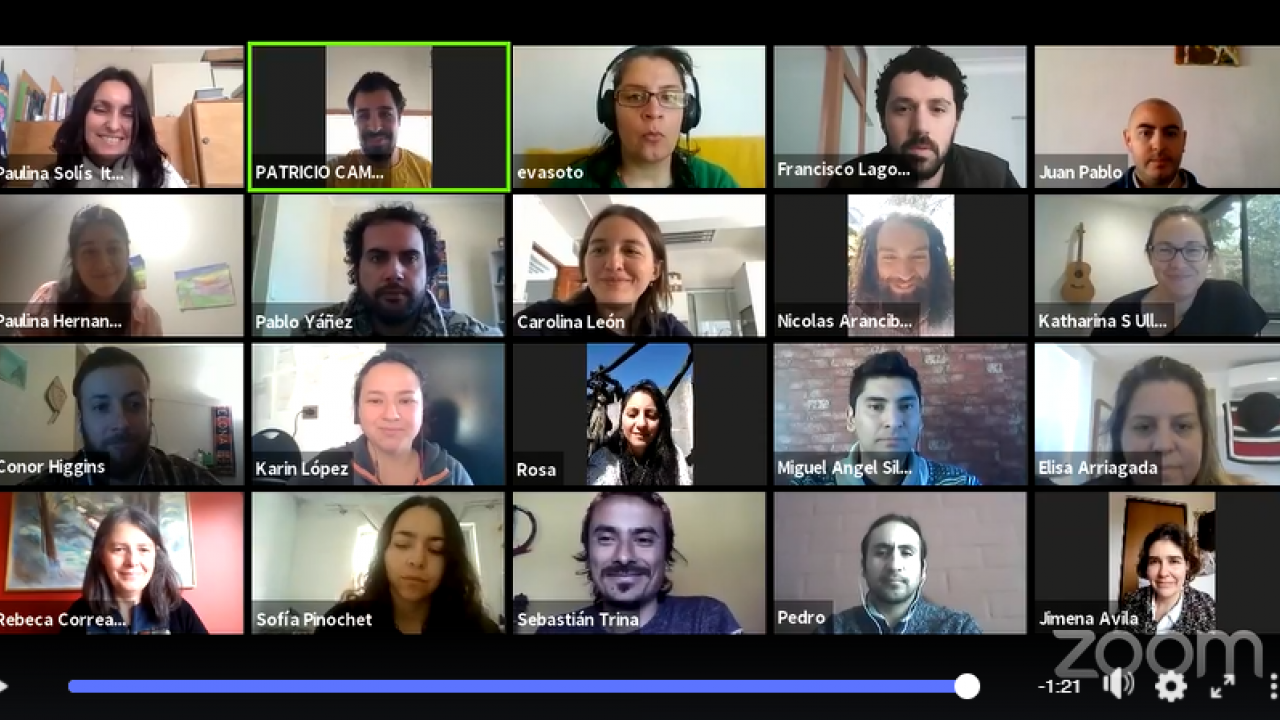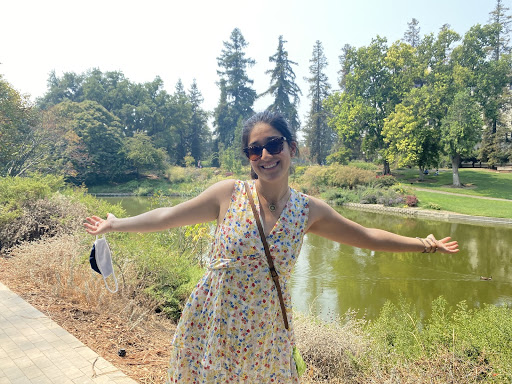
Fall Newsletter: UCD-Chile Student Farm Connections
Chile + UC Davis Student Farm Webinar: different settings, corresponding views
Seminario con Chile y la huerta estudiantil de UC Davis: entornos diferentes, ideas correspondientes (texto en español a continuación)
by Paulina Hernandez (ESM and Spanish '21)

The Student Farm had the opportunity to share and learn alongside a variety of Chilean programs in the webinar, "Espacios de Naturaleza y Sistemas Alimentarios Regenerativos", or “Spaces of Nature and Regenerative Food Systems”. Together with director Katharina Ullmann, Master’s student Conor Higgins, and I, an undergraduate student Paulina S. Hernandez, we were able to represent how all levels of education and backgrounds constitute and collaborate within the UC Davis Student Farm.
I am very grateful to have presented on how the Student Farm is a positive environment that encapsulates a natural space where one can learn and practice sustainable agriculture, among other things. These other things include a myriad of services: a safe space to visit and enjoy/ volunteer/internship/employment opportunities, a CSA, produce donated to food safety programs on campus, workshops for local farmers, and more!
I realized that the community plays an essential role in how the Student Farm is maintained. Similarly, the Chilean programs that were present in the webinar stood for a similar vision: having an educational space to emphasize community. The Huerto Universitario y Agroecológico San Francisco from the Universidad Católica de Chile closely resembled the UC Davis Student Farm; this student farm included a lot of programs with multi-dimensions and functions of the farm, such as study spaces and volunteer opportunities. More in regard to the community aspect, there was a community garden that provided mental health support to a woman dealing with depression, by allowing her to share a safe space with her neighbors while practicing gardening. Likewise, there was another program that focused on creating a garden/park that would serve as a therapeutic space for senior citizens. This would be an inclusive space for families to encourage and embrace gardening practices for all life stages. Yet another program included horticulture as therapy for the development of motor, sensor, physiological, and social skills for children with Down-Syndrome. It was wonderful to see the impacts these programs have had in their communities.
One recurring theme of these programs included urging public policy to permit the creation of these programs, another one included advocating for food sovereignty and safety, such that social inequities, especially in regard to food access, are a prevalent issue. Overall, the multiple programs that presented encompassed the central theme that education is the foundation to spread environmental consciousness. By forming part of this webinar, I was able to expand my intercultural competence. Learning how student farms and related programs around the world are created and managed with such vigor is encouraging. Encouraging to see how natural resources, such as natural spaces, are valued strengthens and gives perspective to the necessity that conserving and caring for the environment is and should be a global effort. By understanding that although the participants were in different settings across Chile and Davis, California, we shared the corresponding view that we are all part of the same global effort to utilize and manage environmental resources in a sustainable way.
You can find a recording of the seminar on Facebook: https://www.facebook.com/147309700990/videos/334363951238305.
Seminario con Chile y la huerta estudiantil de UC Davis: entornos diferentes, ideas correspondientes
La huerta estudiantil de UC Davis tuvo la oportunidad de compartir y aprender junto a una variedad de universidades y programas chilenos. Esto fue posible a través del seminario, “Espacios de Naturaleza y Sistemas Alimentarios Regenerativos Red Campus Sustentable: Compartiendo experiencias en torno a la implementación de espacios de naturaleza en instituciones y organizaciones de la sociedad civil, promoviendo su uso como recurso para la educación ambiental, vinculación e investigación”. Junto a la directora Katharina Ullmann, el estudiante de maestría Conor Higgins y yo Paulina S. Hernandez una estudiante de pregrado, tuvimos la oportunidad de representar los varios niveles de educación y antecedentes que constituyen y colaboran en la huerta estudiantil.
Estoy muy afortunada de haber presentado cómo la huerta estudiantil es un ambiente positivo. Es decir, la huerta encapsula un espacio natural donde se puede aprender y practicar agricultura sostenible, entre otras cosas. Estas otras cosas incluyen una variedad de servicios: un lugar seguro para visitar y disfrutar; oportunidades de ser voluntario, empleado o hacer una pasantía; un CSA (Apoyo Comunitario a la agricultura); productos frescos donados a estudiantes a través de programas de seguridad alimentaria de la universidad; talleres para agricultores en el área y más.
A lo largo de la presentación comprendí que la comunidad toma un rol esencial en la gestión de la huerta estudiantil de UC Davis. De manera similar, las universidades y programas chilenos que estuvieron presentes mantuvieron una ideología similar: usar espacios naturales y educativos para enfatizar el rol de la comunidad. La presentación del Huerto Universitario y Agroecológico San Francisco de la Universidad Católica de Chile fue sumamente parecida a la huerta estudiantil de UC Davis; esta huerta incluye múltiples dimensiones y funciones, como espacios para estudiar y ser voluntario. Más en cuanto el aspecto comunitario, hubo un jardín comunitario que proveía apoyo de salud mental; tan efectivo fue el jardín, que una mujer que sufría de depresión, pudo compartir un lugar seguro con sus vecinos, mientras aprendía y practicaba jardinería. Igualmente, otro programa está en el proceso de planificar un parque terapéutico para personas de la tercera edad. Este parque servirá como un espacio inclusivo para familias con el propósito de fomentar y estimular la integración de toda etapa de vida en espacios naturales. Otro programa presentado usó la horticultura como terapia para el desarrollo de habilidades motrices, sensoriales, psicológicas y sociales para niños con Síndrome de Down. Fue increíble ver el impacto que estos programas han implementado en las comunidades.
Un tema recurrente de los programas era urgir a la póliza pública para que permitan la creación de programas en estos espacios naturales, otro tema fue abogar por la soberanía y seguridad alimentaria ya que desigualdades sociales, especialmente en cuanto al acceso alimentario, son un tema extendido. En general, el tema central reconoció la educación como base de difundir conciencia ambiental. Al formar parte de este seminario, he expandido mi aptitud intercultural. Entender cómo se gestionan huertas y jardines en otros países y ver el ímpetu de estos programas es alentador; alentador porque ver cómo se valoran los recursos ambientales, como los espacios naturales, fortalece la necesidad de cuidar del medio ambiente a un nivel global. Al comprender que aunque los participantes estamos en diferentes lugares, estamos en el mismo esfuerzo global para utilizar y gestionar recursos ambientales de una manera sostenible.
Se puede ver la grabación del seminario en el enlace:
https://www.facebook.com/147309700990/videos/3343639512383050